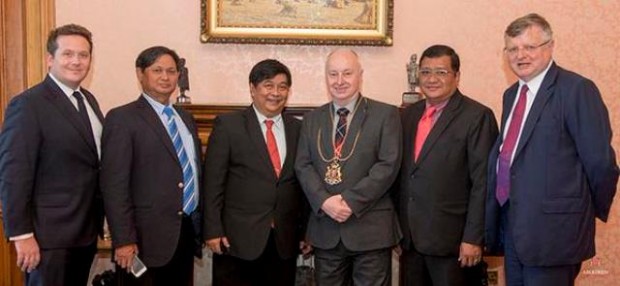
A blog by Tim Duckett, Deputy Director of UKTI Burma
It may be a surprise to some but Burma is one of the world’s oldest oil producers. The industry also has historic links to the UK and Scotland in particular. In 1886 the Scottish owned Burmah Oil was the first foreign firm to drill for oil in Burma.
But the UK’s interest in Burma’s oil and gas industry is not just historic. In 2015 Burma is still a major opportunity for British companies; Burma is already the 10th largest producer of natural gas globally and has potential to move much higher up that list. Indeed, that link back to Scotland is relevant today, as much of Burma’s current resources are in deep water where the UK has internationally recognised expertise as a result of North Sea exploration. We’ve already helped UK companies succeed in this sector; of the 20 offshore licenses awarded last year 8 went to British companies.
Continuing the Scottish theme, in September I organised a visit to Aberdeen by a Burmese Government and Business Delegation headed by Mr Pe Zin Tun the Permanent Secretary of Burma’s Ministry of Energy. The visit was planned around Offshore Europe, one of the world’s premier oil and gas events, which was a fantastic opportunity to showcase Burma’s oil and gas opportunity to the world . But the visit did not just begin and end at Offshore Europe.
The delegation met with a number of Aberdeen based firms all looking to hear more about Burma’s huge potential as the offshore industry develops over the next few years . Capitalising on this opportunity is crucial to UKTI’s work in Burma, as we need British firms to access the oil and gas supply chain if we are to boost exports. The delegation then visited ASCO’s offshore supply bases in Aberdeen and Peterhead that service the North Sea to better understand how an integrated supply chain operates and see an operation that will hopefully be coming to Burma.
Whilst in Aberdeen, we also met with the George Adam, the Lord Provost of Aberdeen to explore future areas of collaboration between Aberdeen and Burma. This potential partnership will be mutually beneficial to both the UK and Burma as British businesses offer a high quality and transparent service. Importantly, they also understand the value of developing local talent and providing employment for local communities. For the Burmese this is crucial, and they are very keen to work with UK training companies and Universities such as Robert Gordon, Herriot Watt and Dundee.
What did I take away?
Scotland’s historic exports to Burma have helped shape the country’s culture and economy. A shared passion for golf and whisky and a thriving oil and gas industry are just three things I can think of! I really got the sense that the history still resonates today. We plan to build on those links harnessing our North Sea experience to develop a long-term partnership between the UK’s offshore industry and Burma. This will be beneficial to both the British economy and Burma.
I was also struck by the resilience and passion of the Aberdeen based firms. No doubt the oil price fall has hit the area hard but there was a real sense of energy and recognition that they needed to move into new markets taking Aberdeen’s pioneering sprit with them. I am sure they will find plenty of opportunity and success here in Burma and UKTI Burma will do everything we can to help them achieve this.
For more information, please click here to download UKTI’s guide to doing business in Burma or email UKTI Burma: ukti.rangoon@fco.gov.uk
